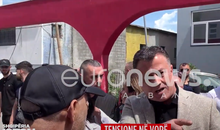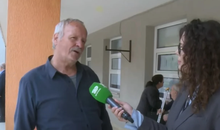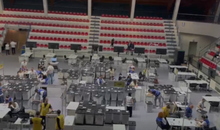
 Flash News
Flash News
Photo/ Brawl at a counting center in Kukës, police try to stop the young man
The first ballot box is counted in Tirana, the DP leads in Unit 2
5 ballot boxes are being counted in the Gjirokastra district, here's how the votes are divided
The first 6 ballot boxes are opened for counting in Kukës
Figures from the CEC are out: 42.16% of Albanians within the country voted in the parliamentary elections
Formation of the new Kosovo government/Analysis: Coalitions still up in the air, eyes on diaspora votes
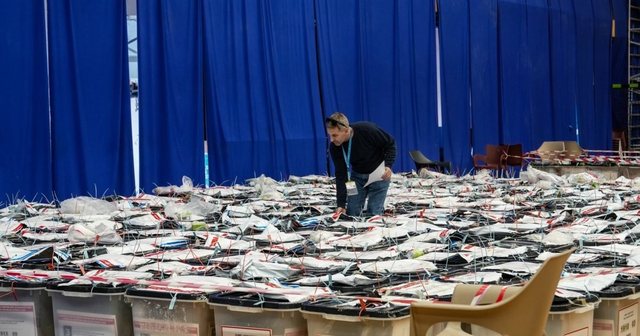
With no party able to govern alone, coalition options in Kosovo are still uncertain. Diaspora votes - which began being counted in diplomatic missions on February 26 - could hold the key. Conditional votes and those of people with special needs also remain to be counted. Two and a half weeks after Kosovo's parliamentary elections, there is no clear idea of what the country's new institutions will look like.
Behind the scenes, negotiations and calculations may take place, but little is said in public. Observers say that, in light of the rapid geopolitical developments in the world, it is important for Kosovo to have stable institutions as soon as possible.
"The establishment of institutions based on the results of the February 9 elections is necessary both because of Kosovo's interests in terms of European integration, but also because of the challenges that await it in terms of the economy and politics," says Besar Gërgi, from the Group for Legal and Political Studies (GSLP) in Pristina.
The current Prime Minister, Albin Kurti, said on February 26 that it is up to his party, the Vetëvendosje Movement, “as the clear winner of the elections,” to form Kosovo’s institutions. According to preliminary results, this party came first with about 40 percent of the vote, followed by the Democratic Party of Kosovo with about 22 percent, the Democratic League of Kosovo with about 17 percent, and the Alliance for the Future of Kosovo - Nisma coalition with about 7 percent.
These figures show that no party has enough votes to form a majority in Kosovo's 120-seat Assembly. The votes of the diaspora - which number over 80,000 - as well as conditional votes and votes from people with special needs - remain to be counted. Kurti said he expects the Central Election Commission to release the final results for political entities next week.
"We all expect from the CEC even more commitment to completing the counting process and increased care in protecting the will of voters," he said.
After declaring victory in the February 9 elections, Kurti expressed confidence that his Vetëvendosje party would form a government independently. During his speech that night, he used derogatory language towards opposition parties - which some analysts interpreted as a message that he would not seek a coalition with them.
The possibility of a coalition with Vetëvendosje has also been ruled out by PDK, LDK and AAK, but not by the latter's partner, Nisma. Nisma's leader, Fatmir Limaj, has not drawn "red lines" in front of possible coalitions, either with the Vetëvendosje Movement or with the current opposition parties.
“Kush më fton në tavolinë, unë shkoj. Për Kosovën”, ka thënë Limaj në një paraqitje në Radio-Televizionin Dukagjini.
Radio Evropa e Lirë kontaktoi Limajn dhe zyrtarë të tjerë të partisë së tij për t’i pyetur se a janë duke u zhvilluar bisedime për koalicion me Vetëvendosjen dhe, nëse po, deri ku kanë mbërritur ato, por, përkundër disa përpjekjeve, nuk mori përgjigje.
Ngjashëm nuk u përgjigjën as zyrtarë të Lëvizjes Vetëvendosje. Bekim Salihu, nga Instituti për Studime të Avancuara - GAP, thotë se rezultatin përfundimtar të zgjedhjeve të 9 shkurtit, do ta përcaktojnë votat e diasporës. Ai beson se partitë janë duke pritur certifikimin e rezultateve - që është paralajmëruar se do të bëhet në mes të marsit - për të bërë hapa konkretë drejt koalicioneve eventuale.
Me votat e numëruara deri tash, Vetëvendosje i ka 47 deputetë në Kuvendin e Kosovës, e për të formuar shumicën i duhen së paku 61. Salihu pret që Kurti të sigurojë ndonjë deputet nga votat e diasporës, ndërsa llogarit edhe në dhjetë deputetët e komuniteteve joserbe, si dhe në një deputet nga serbët, por jo Lista Serbe.
“Ndaj, unë e shoh të mundshme që Vetëvendosje ta shfrytëzojë opsionin e Limajt, duke aplikuar edhe një lloj ‘kontraktimi’ të deputetëve të tjerë, për të mbështetur qeverinë”, thotë Salihu për Radion Evropa e Lirë.
Mendim të ngjashëm ndan edhe Gërgi nga GSLP-ja, por shton se një shumicë e tillë, me minimumin e deputetëve të kërkuar, nuk do të ishte stabile. Ai sheh edhe një opsion tjetër të mundshëm.
“Opsioni B është që Lëvizja Vetëvendosje të bëjë një koalicion qeverisës qoftë me PDK-në, qoftë me LDK-në, në mënyrë që të ketë një stabilitet në qeverisje, si dhe të ketë numra të mjaftueshëm për zgjedhjen e presidentit në prill të vitit të ardhshëm”, thotë Gërgi.
Mandati i presidentes aktuale, Vjosa Osmani, përfundon më 7 prill të vitit 2026. Për Besar Gërgin është shumë urgjent, sidomos kur merren parasysh zhvillimet gjeopolitike në botë, të cilat, siç thotë, ndryshojnë dita-ditës. Jashtë luftës në Ukrainë, që ka marrë vëmendjen kryesore të BE-së dhe SHBA-së, Gërgi përmend edhe mundësinë e trazirave në Bosnje e Hercegovinë, si pasojë e dënimit të presidentit të Republikës Sërpska, Millorad Dodik.
“Kështu që është jashtëzakonisht e rëndësishme që Kosova të ketë shpejt një qeveri stabile dhe një udhëheqësi të sigurt në këto ujëra të rrezikshme gjeopolitike, në të cilat kemi hyrë”, thotë Gërgi.
“Unë besoj se partitë janë ngutur për të vendosur ‘vijat e kuqe’ pas shpalljes së rezultateve preliminare. Tash, duke parë realitetin e ri që po krijohet në terren, ato do të detyrohen që t’i rikonsiderojnë këto vija të vendosura”, shpreh bindjen Gërgi.
Salihu, në anën tjetër, thotë se Lëvizja Vetëvendosje nuk është në situatë për të nxituar me formimin e qeverisë së re, për shkak se buxhetin për këtë vit e ka të miratuar.
"So, we have an incumbent government, led by LVV, and, of course, the incumbent government has no time limit. The incumbent government can take all actions like an elected government," says Salihu.
According to him, the only limitation is the fact that she cannot proceed with laws and international agreements for approval in the Assembly. According to the Constitution of Kosovo, 30 days after the certification of the official election results by the CEC, President Osmani must call the constitutive meeting of the Assembly of Kosovo. The constitution ends with the election of its president and vice-presidents. This practice can also last - in 2014 it took about six months./ REL
Latest news


Counting begins in Shkodra district, first two ballot boxes open, DP leads
2025-05-12 01:41:21

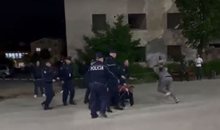
Photo/ Brawl at a counting center in Kukës, police try to stop the young man
2025-05-12 01:04:32
The first ballot box is counted in Tirana, the DP leads in Unit 2
2025-05-12 00:56:22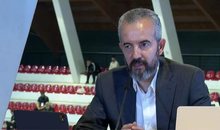
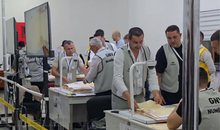
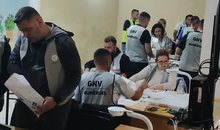

Vote counting begins in Mirdita
2025-05-12 00:25:21
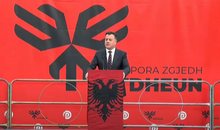
Noka accuses Balla: His bags will be separated! I will monitor every vote
2025-05-12 00:01:41
Journalist: Patronage agents who took voters and took them to vote
2025-05-11 23:49:19

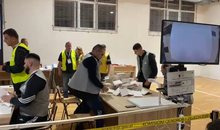
The first 6 ballot boxes are opened for counting in Kukës
2025-05-11 23:22:21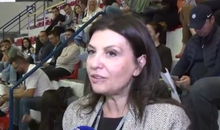
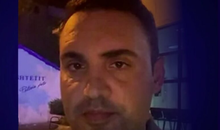

Celibashi with foreign observers arrives at the Olympic Park for Diaspora votes
2025-05-11 22:56:36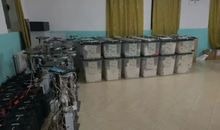
The first 3 boxes in Pustec are counted, how the result is presented
2025-05-11 22:53:25

Helena, as Rama's tool to attack the CEC
2025-05-11 22:31:34
Organized crime "oriented" the vote in Durrës
2025-05-11 22:21:32
Albania is a very strange place.
2025-05-11 22:11:51
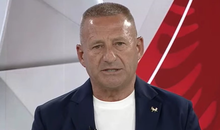
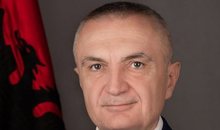
Meta: The drug state is giving up, it cannot stop the people's victory
2025-05-11 21:41:12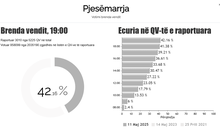

Rape of commissioner and his family in Pogradec, 4 more wanted citizens arrested
2025-05-11 21:24:36
Vote counting begins in Pustec, including diaspora votes
2025-05-11 21:11:22

Tension at the shelter of patronage activists, police escort 3 people
2025-05-11 20:56:33
Berisha accuses PS: After "Petro Nini" illegal office also in Astir
2025-05-11 20:56:30
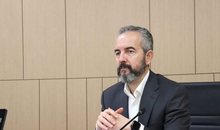
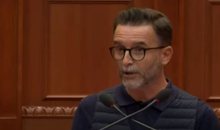

First ballot box counted in Vora, DP leads in Domje
2025-05-11 20:22:06


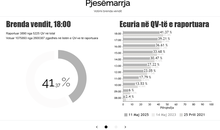
Dibra records record turnout in elections, Vlora least interested
2025-05-11 19:43:00




Police intervene at the office of the patronage workers in Tirana
2025-05-11 19:18:52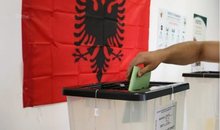
Elections 2025, voting hours officially end
2025-05-11 19:05:14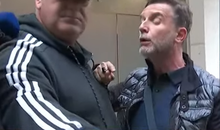

Elections 2025: Law for one party, tolerance for the other
2025-05-11 18:46:14
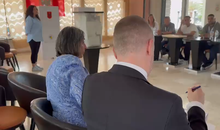
OSCE-ODIHR observers monitor the voting process in Saranda
2025-05-11 18:22:13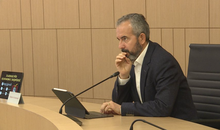
SP's request to postpone voting hours in Vlora fails at CEC meeting
2025-05-11 18:13:04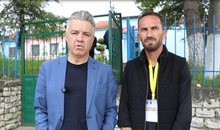
Bozdo: Go out and vote, your will will be unchangeable!
2025-05-11 18:00:38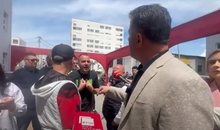
A word of advice for government thugs
2025-05-11 17:52:40
Accident on the Korça - Pogradec axis, two injured near the village of Pirg
2025-05-11 17:50:14


Another person arrested for photographing the vote in Elbasan County
2025-05-11 17:27:53
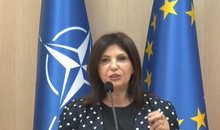
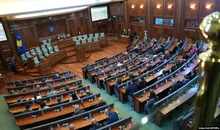


Electoral crimes/ Xibra administrator and a person from Klosi reported to SPAK
2025-05-11 16:55:01
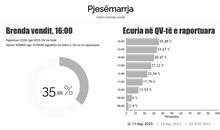
Parliamentary Elections 2025/ National turnout by 4:00 PM reaches 35.88%
2025-05-11 16:45:24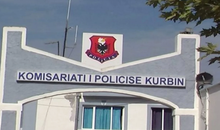
Conflict in Fushë-Milot, police issue statement: No shell casings found
2025-05-11 16:42:20
The brother of the SP candidate in Belsh intimidates voters
2025-05-11 16:24:53

Clashes in Vore CEAZ, CEC revokes observers' accreditation
2025-05-11 16:15:41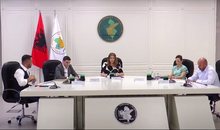

These fruits and vegetables remove toxins from the liver
2025-05-11 16:03:45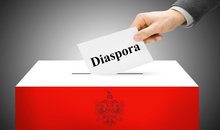
Elections 2025/ Diaspora votes massively, participation until 3:00 PM
2025-05-11 15:59:13
Fight at a polling station in Fushë-Milot, gunshots fired
2025-05-11 15:56:15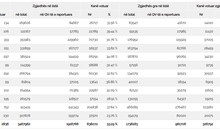
Figures/ Vlora, the region with the lowest voter turnout
2025-05-11 15:37:55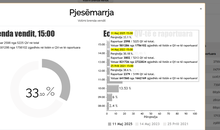
Elections 2025/ What was the voter turnout until 3:00 PM?
2025-05-11 15:32:37
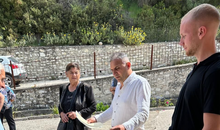
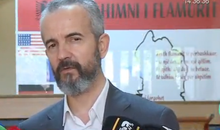
Celibashi: Photographing votes is punishable by 3 years in prison
2025-05-11 15:13:50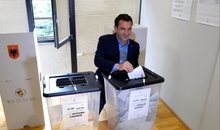
Erion Veliaj votes in the Durrës detention center
2025-05-11 14:59:57
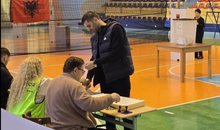


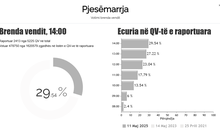
Low turnout, CEC releases figures: How many citizens have voted by 2:00 PM
2025-05-11 14:31:11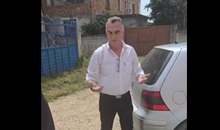
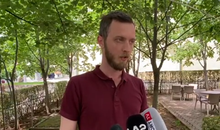
Citizens from Kosovo vote in Kukës
2025-05-11 14:11:33

The electoral process in Librazhd is interrupted, a person photographed the vote
2025-05-11 13:54:30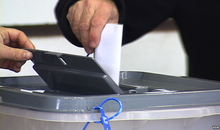
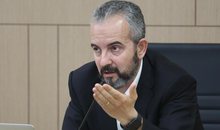
Celibashi: 8% of polling stations opened late
2025-05-11 13:47:12
Tragic accident in Peshkopi, police officer Veli Gjura dies at Trauma Hospital
2025-05-11 13:43:02

Berisha on vote alienation: Whoever violates the law will be held responsible
2025-05-11 13:26:47
CEC: Voter turnout until 12:00, lower than in 2021
2025-05-11 13:00:45

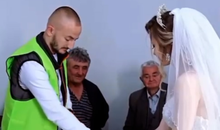
Bride votes before going to wedding in Elbasan: Democracy before the ceremony
2025-05-11 12:41:23
